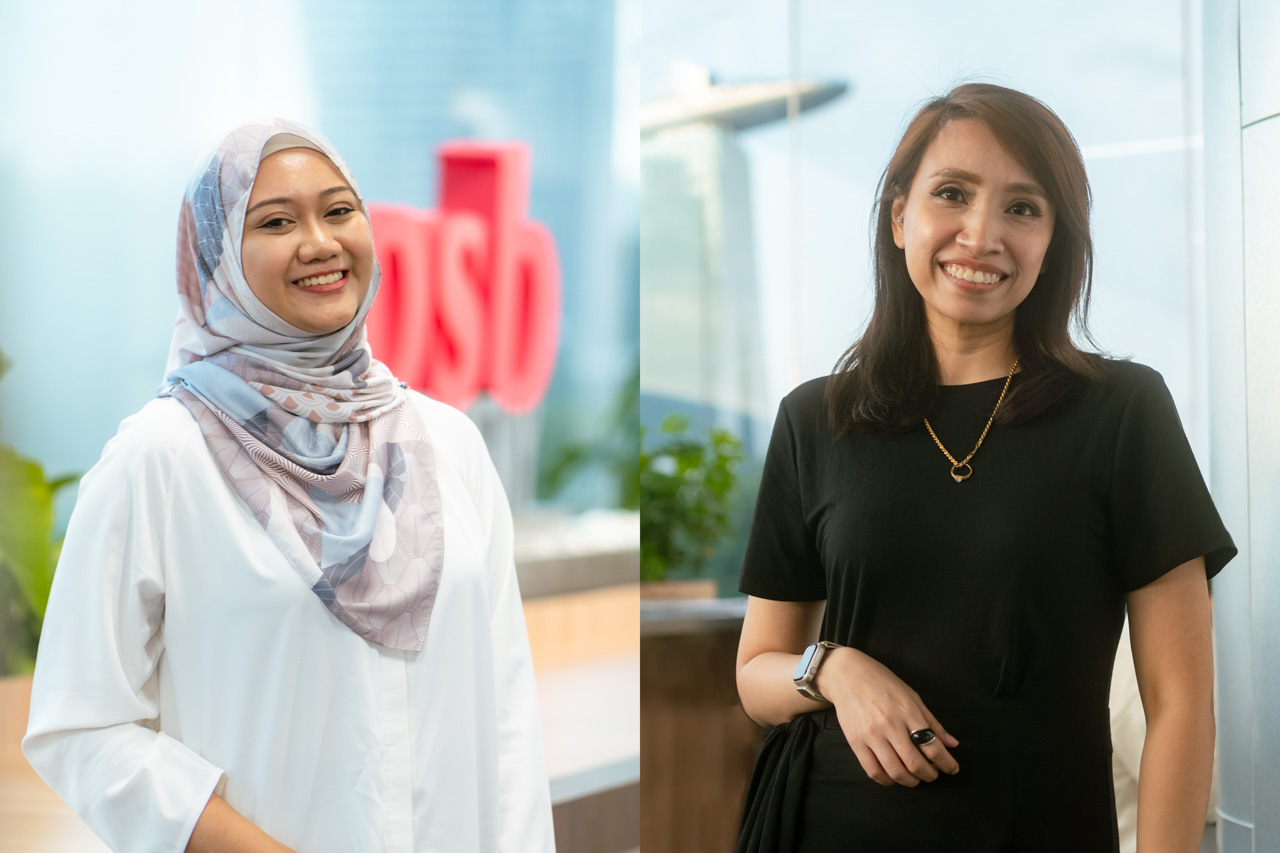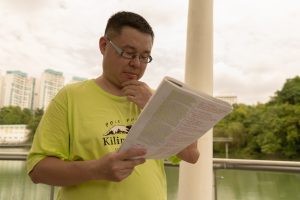All images by Stephanie Lee for RICE Media.
Since I was young—if I may just pat myself on the back here—I’ve never flopped in my education.
At 12 years old, I came top of my class in PSLE, got into a good secondary school within the Express stream, scored well for O Levels and managed to enter the course of my choice in a local polytechnic. All seemed well. The question “So, what are you doing now?” was never a difficult one to answer at every family gathering.
That is, until I graduated with a diploma in 2015.
At 20, I had to decide what was next. My friends, most of them from JCs, naturally found themselves enrolling into the likes of NUS or NTU for their degrees. The same names would pop up at every school university fair, and on social media.
I decided to apply for a degree course at a private education institute. For the first time in my life in Singapore, I found myself struggling to answer the question I was always asked: “So, what are you doing now?”
My replies always left most puzzled. Some had a follow-up question: “Oh? Where is that?”.
“It’s in Singapore, lah,” I’d respond.
The ‘Right Path’ to Success
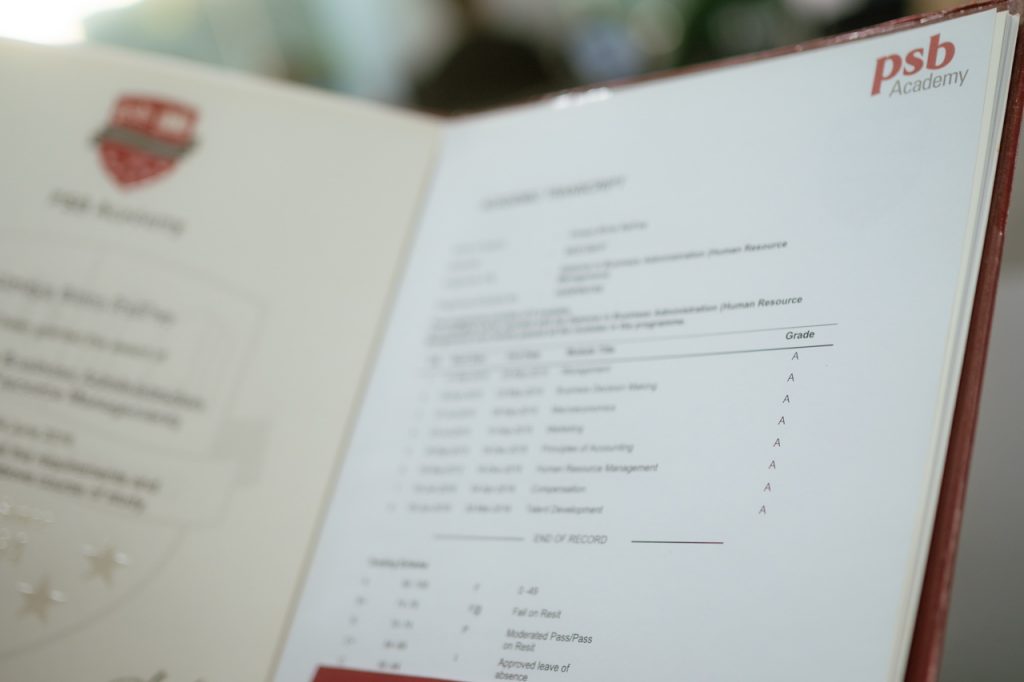
With the recent release of O-Level and A-Level results, every Singaporean student (and their cast of quizzical extended relatives) seems to be focused on what’s next. Our education system is well-known to be one of the best in the world—those who go through it can attest to the pressure that comes with it. There’s always the struggle in picking the ‘right choice’.
But what exactly is the ‘right choice’? Is there truly only one ‘right path‘ to success in Singapore? While Singapore houses prestigious local universities, are these the only institutions that can secure a livable future for everyone? If you enter a private education institution, are you missing out?
There’s always the belief that local universities are key to a stable career. Private education institutions can be seen as less credible—after all, unlike local universities, enrolment doesn’t rely heavily on your past academic performance.
“I have two boys in NS now and if I’m being honest, I would love to see them continue their studies in a local university,” Umaya Rafiee, or Maya for short, tells me as she shares her experience juggling life as a mother and a business major at PSB Academy many years back.
To her, public universities still offer a passport to a secure and stable future. This, despite the fact that she thrived from a diploma education from a private education institution herself.

Yet, Maya has been thinking of progressing with a degree course with PSB Academy. Since her two boys are also considering their options for further studies, she imagined it would be nice for all of them to be enrolled in the same school.
The only issue that bugs her is the local stigma around private education institutions.
The last thing she would want for her sons is to be seen as “second-class” learners and employees in the workplace. Especially when mean comments on social media have been seen labelling degrees from PEIs as mere ‘toilet paper‘ degrees.
Stability is crucial to Maya. Having dropped out of secondary school, she wanted to redeem herself and set a good example for her children. Having felt like she was a “leftover” in the rat race for academic excellence, Maya found an option at PSB Academy, a private education institution (PEI), to obtain her diploma in business administration.
“I even planned to make sure my delivery date did not clash with any of my submissions,” she explained.
She wasn’t referring to her assignment deadlines. She was referring to the date she was expected to give birth to her fourth child.
Maya’s school and lecturers helped her throughout her pregnancy during the duration of the course. During the times when her body felt weak, she was given the option to reschedule her classes or—in a pre-WFH age—even attend them online from home.
The Age-Old Question
While some may frown at the diverse profiles of learners in PEIs (often with students who vary from 17 years of age to the mid-50s) I find myself experiencing a different situation.
In my classes, the eldest was 23—not unusual when Singaporean boys head to university after two years of NS. Yet, I’d hear stories from friends in government universities about students pushing their mid-30s in classes like mine.
Now, Maya works as a senior consultant for one of the most reputable MNCs in Singapore. The flexibility and empathy shown by her school administrators allowed her to complete her studies, but Maya remains conflicted on the subject of PEIs.
So much so that she struggled to explain to me why she still believes one should not “miss out” on the opportunity to study in government and autonomous schools.

Her personal unease does not get in the way of being a mother, though. She stressed that no matter what choices her children make for their education, she will be fully supportive.
Maya is confident that with more awareness about what PEIs can offer, more people would be open to consider taking up their courses—to break down walls of judgement that have been standing for far too long. For discrimination on these so-called toilet paper certifications to be put to a stop.
“If I can go to school with my boys, that would also be great!” I saw the gleeful excitement of a mother thinking about going back to PSB Academy with her two sons.
To her, at least, having an education alongside them is a real achievement no piece of paper can qualify for.
Knowledge as the Journey
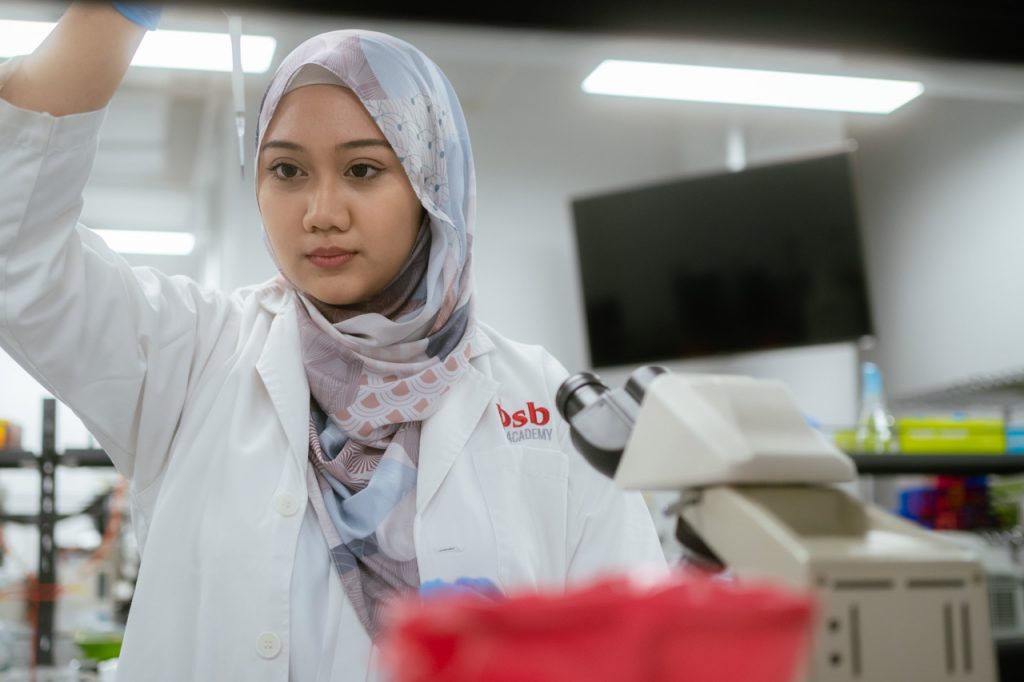
Hidayah Nabillah, a life science graduate from PSB Academy, is currently working as an Associate Research Scientist at Singleron Biotechnologies. During her first week on the job, she learned how she was the only Singaporean in her department with a degree from a PEI.
“It’s a bit intimidating when I first started working with them,” she admits to me. “But when I think about it again, the knowledge and skill sets that I have are no different than theirs. We still get the same job done to the best of our abilities at the end of the day.”
Hidayah spoke about how she initially felt intellectually “lesser” than her colleagues. And yet, the quality of work she puts in, day to day, betrayed her insecurities.
Her employers and colleagues never once singled her out for being a PEI graduate. They recognise that her performance at work is never assessed based on her choice to pursue her studies through the ‘path less travelled’. Hidayah felt assured, gaining even more confidence in her work that could stand on its own.
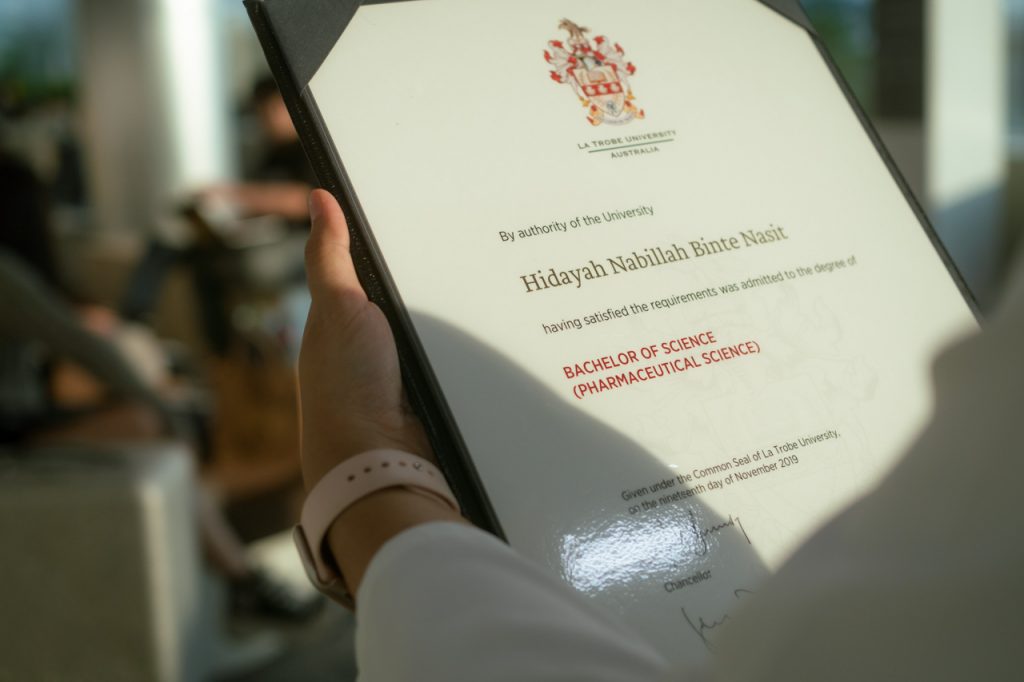
Hidayah became interested in pharmaceutical science after her dad was diagnosed with multiple illnesses. This required a long list of medications that needed to be taken, some at different intervals. She had to be right at his side to make sure he could follow through with each dose.
It is not the name or the destination of the school that brought her to where she is now—it was her genuine spirit to find knowledge wherever she could. She repeatedly told me how her lecturers were one of the best she had, always taking the time with their students even after class.
As a PEI graduate myself, speaking with both Maya and Hidayah reminded me again why I never once regretted my choice. Your school does not define your outcome.
Is It Worth It?
The question of worth can stem from two perspectives: That of a student, and that of an employer.
One common concern from local university graduates—when I asked about why they did not pursue their studies in a PEI—was the issue of cost. Students of private education institutions do not benefit from MOE tuition grant schemes, which makes the costs of studying in PEIs higher.
For many, enrolling into PEIs may sound like a huge gamble, due to their relatively lesser-known status.
PSB Academy’s dean, Dr Charles Ong, shares his statement about the cost of PEIs.
“Course fees set by PEIs like PSB Academy have taken into consideration various factors such as the learning tools, technology and expertise that goes into developing them, while also being mindful to ensure its affordability for our students,” he states, sharing that there are also a number of scholarships and sponsorships offered by various PEIs.
“Degree-level programmes offered through PEIs are usually priced much lower than the actual cost of programmes in their local campus counterparts,” he adds.
“For instance, if a student were to study the La Trobe University Biomedical Science programme in the Australian campus, it would cost more than twice the amount compared to studying the same programme in a PEI in Singapore.”

Benjamin, a PEI graduate who’s currently working as an HR manager, shared that some employers may feel reluctant to hire graduates from PEIs. Unlike local universities, they are not aware of the standards these schools uphold and the variety of curriculums offered.
This ambivalence extends to its graduates. Many companies often grapple with questions like, “Is it worth it to pay them a high salary for something they may not be prepared for?”, or “Will there be good ROI? (return of investment)” are always at front of mind for many companies, including the one Benjamin works for.
As someone who possesses a degree from a PEI himself, he knows the unique frustrations that come with applying for jobs. “There’s a certain amount of distrust in the workforce that questions the capability of PEI graduates,” he explains.
“Employers have nothing to refer to other than the reputation of the university you come from, along with whatever you tell them during the interview.”
He adds that he’s noticed other applicants with PEI degrees scrutinised with additional hurdles. “They’ll ask questions like, ‘Can you show us a practical use of the abilities that you say you have?’ I just find that a little bit too coincidental.”
From his own academic experience, he recalls lecturers who didn’t “teach to the expectation you would expect from local lecturers”, and that the amount of attention given to individual students “may not be the same.”
And yet, in his current position, he’s found candidates from PEIs, or applicants without degrees entirely, to have been the most promising.

It all boils down to an interesting contrast in attitudes: “At work, you can make a mistake! This is perhaps one of the lapses in our education system: There is simply no room for error.” He has found that new hires from local universities are efficient, but offer little in creative solutions and problem-solving skills.
“Application is the most important thing,” he stressed. “If you can’t apply what you’ve learned, then your qualifications are useless.”
Spread Your Wings
Dr Charles advises those considering education with PEIs to carefully research their options by assessing the potential benefits and drawbacks of pursuing their studies through the PEI route.
Often, misconceptions surrounding education in local PEIs stem from a lack of awareness. As a reputable PEI, PSB Academy aims to address this misconception.
PSB Academy supports its students beyond just classroom lessons. They offer career guidance, job placement assistance, and access to industry contacts and job fairs.

“A dream does not become reality through magic; it takes sweat, determination and hard work” – that’s a quote Hidayah wanted to share with fellow students, who are thinking about the next chapters of their lives beyond the degrees. A popular school and fancy names mean nothing without actually putting in the effort.
Maya puts it best. “Education is a life-long path. It does not end, not even after you have kids. Never give up and if you feel like all doors seem closed, there’s always one that swings open, like how PSB Academy opened their doors to me.”
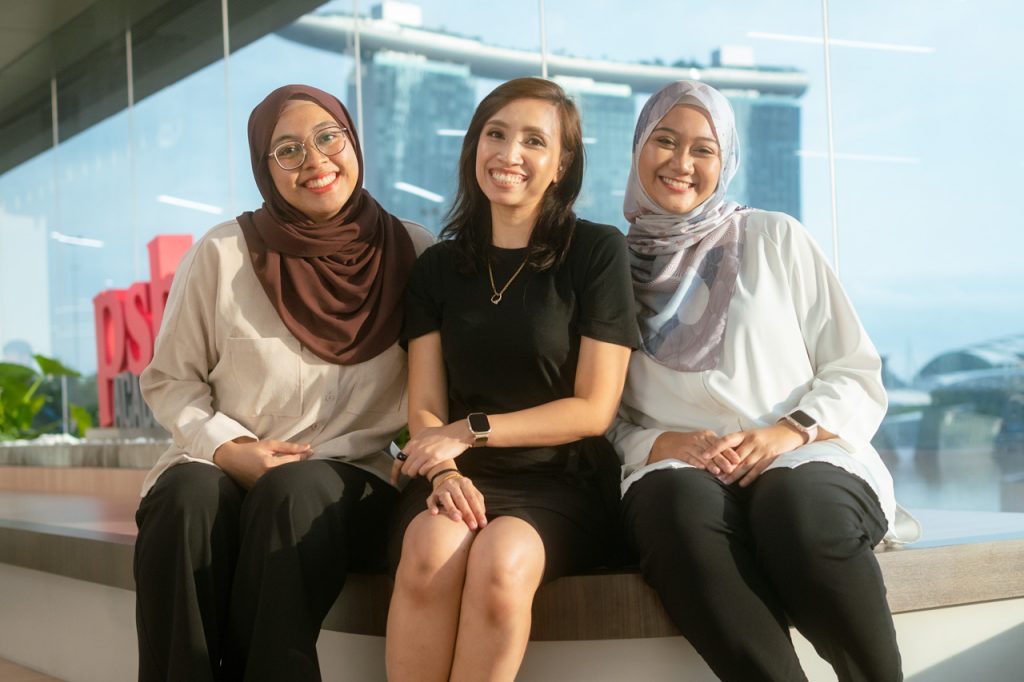
Is Singapore ready to shed the glorified perceptions of our local universities and take the time to learn about private education institutions like PSB Academy? Can the barriers between private and local graduates be broken down? Will employers one day not rely on academic performance to gauge professional abilities?
These are questions we have to observe in the next few years as a new generation of youths grow into the world of tertiary education and the workforce. Pursue what you want, work hard, and life will follow.

